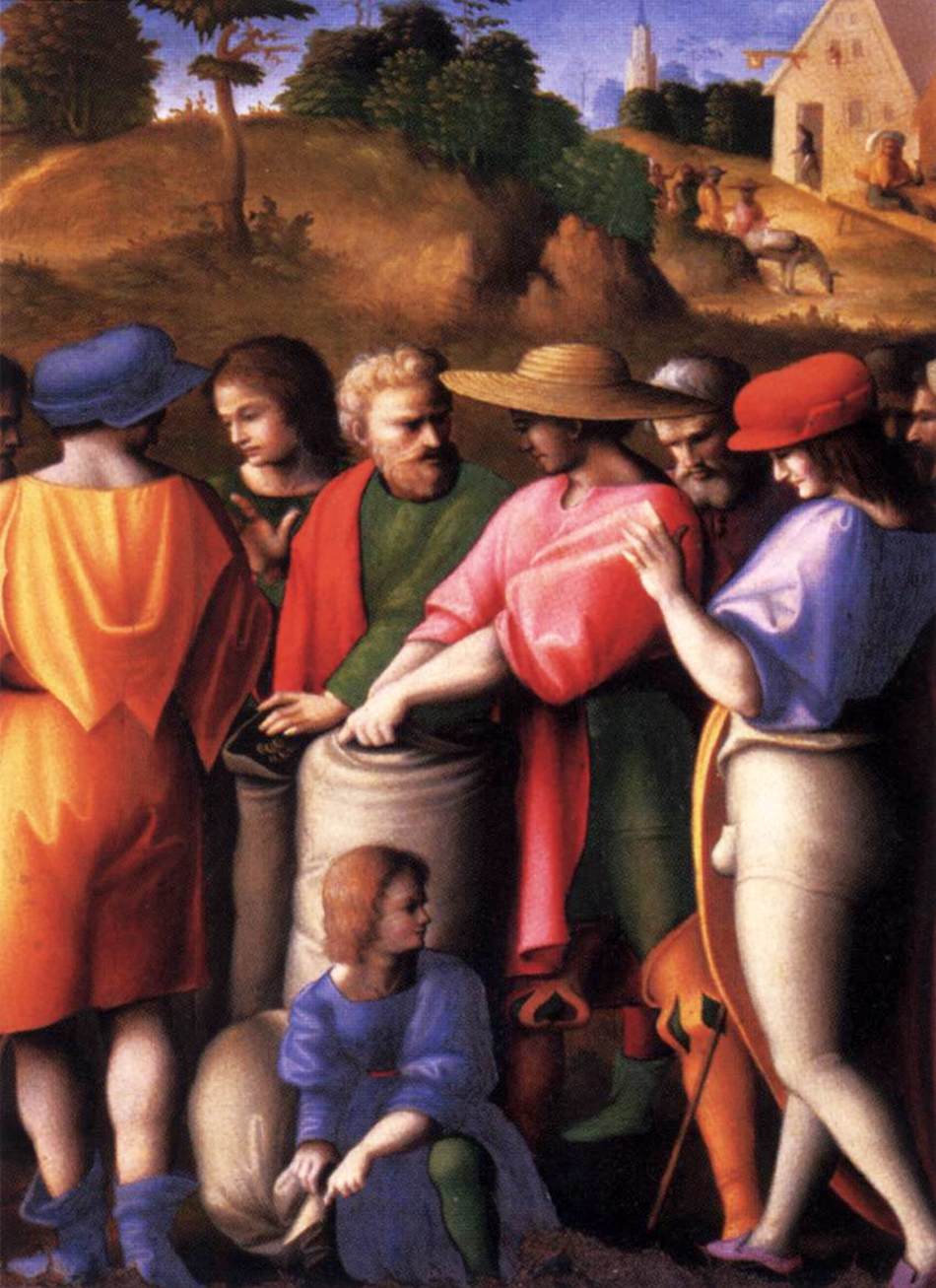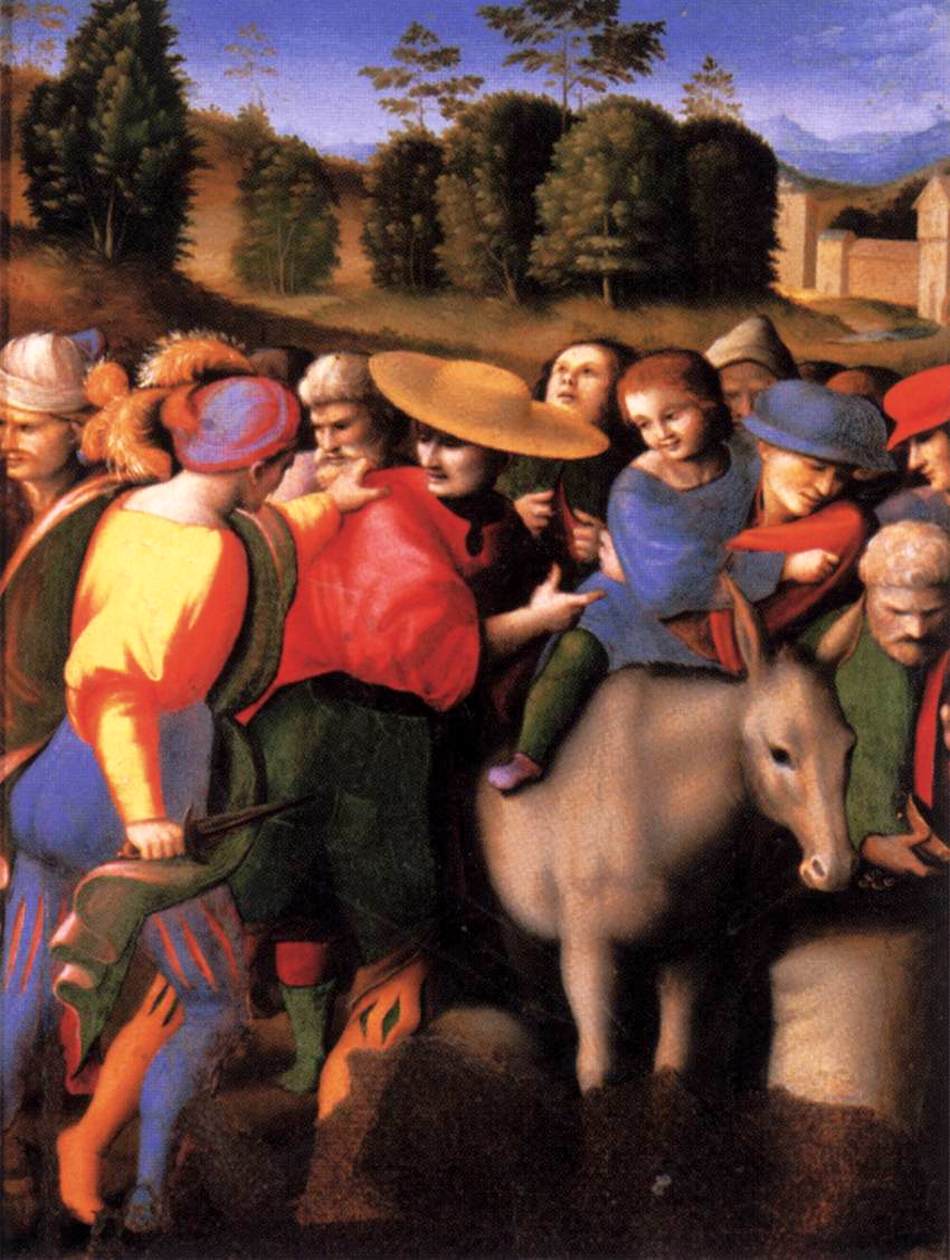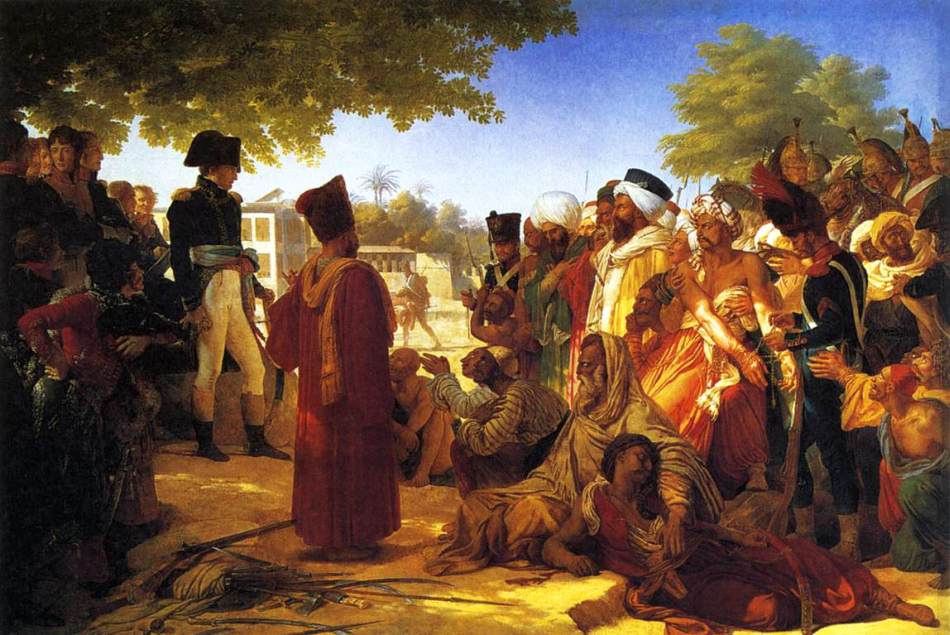DAWN
Daily Arts Web Nucleus
Discover the Arts! Each day a different image from the Literary, Performing, or Visual Arts representing a portion of Scripture plus an explanation with links 2017 February 25



Image 1: Scenes from the Story of Joseph: The Search for the Cup (1515-1516)
Mannerism Style; Florentine School
Galleria Borghese, Rome, Italy
Image Source: Web Gallery of Art
~~~~~~~~~~
Image 2: Scenes from the Story of Joseph: The Discovery of the Stolen Cup (1515-1516)
Mannerism Style; Florentine School
Galleria Borghese, Rome, Italy
Image Source: Web Gallery of Art
~~~~~~~~~~
Image 3: Napoleon Pardoning the Rebels at Cairo (1808)
Pierre-Narcisse Guerin (1774-1833)
Romanticism Style
Palace of Versailles, Versailles, France
Image Credit: Web Gallery of Art
SPECIAL NOTE:
[ I will again be working through the Scriptures from Genesis to Revelation. I will be adding links, resources, images, and the like, upgrading the former work-through which began with the 2013-10-12 posting which can be found, along with the full Genesis to Revelation postings, in the Archive Page. Postings will be at midnight Eastern Time, as I am able. However, no days will be skipped, even though a posting may be late. And all postings will be housed in the Archive Page. ]
Explanation: Genesis 44 contains the incident with the silver cup, which is the turning point in the story of Joseph and his family. It began with a command by Joseph to put his silver cup in the sack of Benjamin together with his purchase money and to return the money of all the other brothers to their sacks as well (1-2). The brothers left early in the morning; but before they got far away, Joseph told his steward to accuse them of stealing his silver cup and bring them back (3-5).
The brothers denied the accusation and offered to let the thief die and to present themselves as slaves to Joseph if it were true. They opened their sacks beginning from the eldest to the youngest. When they found the cup in Benjamin's sack, they tore their clothes, loaded their donkeys, and returned to Joseph (6-13). Joseph's brothers fell before him, saying that God had found out their iniquity, and they offered themselves as slaves. But Joseph said that only the one who had the cup would be a slave (14-17). Judah then began to plead for the release of Benjamin, reminding Joseph that, on their previous visit, he had told Joseph that it would kill his father, Jacob, if he lost Benjamin (18-23).
Judah also told Joseph that, before he came this second time, his father had again reminded him of the prior loss of one of their brothers and of his deep fear that evil would befall his youngest son, Benjamin (24-29). He told Joseph that the shock of losing Benjamin would kill his father; so he asked to be a slave in place of Benjamin lest he see the evil that would come upon his father (30-34).
NOTE: In the next chapter, Joseph reveals himself to his brothers, and he again asks if his father is alive. He never quite seemed to believe his brothers that Israel was still alive. Whatever the case, he seems to be focused on being reunited with his full brother, Benjamin. He was motivated by family ties, but he also may have worried that his brothers would have hated and mistreated Benjamin, the other favored son of the favored wife, Rachel. He may have also feared for Benjamin's life.
Nevertheless, he seems to be willing to bless his brothers and the rest of his family anonymously. But he has forgotten his father's house (Genesis 41:51) and wants to keep it that way, except for reunion with Benjamin. Presumably, he would have revealed the truth to Benjamin after the rest of the family once again disappeared from his life.
He has already traumatized his brothers and Jacob by retaining Simeon in jail until they got back. He seems curiously insensitive to this. This would have traumatized Benjamin, who was completely innocent of any wrongdoing. Carnality, not spirituality, seems to be in operation here. Profound changes are being wrought in Joseph and in his brothers. But it seems to me to be the kind of changes that only God can make. It does not seem to be within the power of Joseph (or any man) to devise a stratagem that would produce these changes. I believe that we see, in the life of Joseph, a struggle between his God-centered impulses and his self-centered impulses
.
Also, it seems to me that Joseph has a clear focus in being reunited with Benjamin. But he seems to be so intent on this that he ignores the trauma that came upon his father (and Benjamin) by imprisoning Simeon. Perhaps he was still unconvinced that his father was alive, or so it seems from the fact that he asks if his father is still alive after he reveals himself to his brothers. This may also explain why he was willing to retain Benjamin. If Jacob was not alive, Jacob would not be traumatized by the kidnapping of Benjamin. Also, for Joseph to use false accusation to keep Benjamin for himself is ungodly, unwise, and uncharacteristic of Joseph's spirituality. In short, it seems to be a fleshly device. Joseph further traumatized Benjamin by falsely accusing him of theft, arresting him, and marking him out (ostensively) for slavery. Benjamin deserved none of this, even if Joseph intended to make the trauma brief. I cannot see this as a godly device produced by godly wisdom. It is selfish. And it duplicates upon Benjamin, by Joseph's hand, the evil which Joseph's brothers did to him earlier. The Joseph narrative contains many duplicates (sets of two) words and speeches are repeated, similar incidents are repeated, etc. But of all the sets of two in the narrative, the undeserved evil done to Joseph and then to Benjamin, the only two sons of Rachel, is perhaps the most striking. Also, the story begins with a set of villains (the ten brothers) and a single hero (Joseph). It ends with a single villain (Joseph) and a single hero (Judah).
It is Judah's godly plea that breaks Joseph's desire to have nothing to do with anyone but Benjamin. This and the previous trauma which the other brothers experienced also broke their sin. So, in my opinion, Judah, not Joseph, emerges as the spiritual hero of the narrative.
[ Sermons: William Still. Edward Donnelly. Various. ]
[ Illustration: Today's paintings illustrate the main events of today's chapter. Image 1 depicts the beginning of the search for Joseph's cup. It should be noted that the artist has made Benjamin much too young. He would have been about 15 or 16 at this time, having been born a year or so before Joseph was sent into exile. Image 2 depicts the arrest of Benjamin. As in the previous painting, the artist has made Benjamin much too young. Image 3 is symbolic of Joseph's brothers seeking clemency from Joseph, who is represented by Napoleon. They are led by Judah, represented by the man standing in the center of the group wearing the black and white turban and the yellow cloak. ]
RESOURCES
PLEASE NOTE: Use the resources on this and other sites thoughtfully, particularly the commentaries and encyclopedias. I have attempted to list conservative, scholarly resources. However, some providers use liberal or liberal-influenced commentaries such as the Cambridge Bible for Schools and Colleges (in Bible Hub). Such commentaries are undoubtedly included by the provider for the wealth of useful information and comments which they provide. By consulting several commentaries, it should be fairly easy to sort out the wheat from the chaff. If, however, you would like personal assistance, write to me at AD LIB ARTS EMAIL.
[ THEMATICALLY AND CHRONOLOGICALLY RELATED SCRIPTURES: Genesis 44: [9] Genesis 31:32.
[14] Genesis 37:7; Genesis 42:6; Genesis 43:26.
[20] Genesis 37:30; Genesis 42:13; Lamentations 5:7.
[23] Genesis 42:20; Genesis 43:5.
[34] Genesis 21:16.
-- From the KJV Reference Bible ]
[ CHRONOLOGY: GENERAL. Patriarchs (Traditional). Judges # 1. Judges # 2. Kings # 1. Kings # 2. Prophets # 1. Prophets # 2. NT # 1. NT # 2. NT # 3. ]
[ MAPS: Maps # 1. Maps # 2. Maps # 3. Maps # 4. Maps # 5. ]
[ COMMENTARIES, ETC: GENERAL: Bible Study Tools; Bible Hub: Study Light; Blue Letter Bible // PSALMS: Monergism: Precept Austin: The Treasury of David; John Gill; John Calvin - Volumes 1, 2, 3, 4, 5]
[ MUSIC: GENERAL: The Cyber Hymnal // PSALMS: Genevan Psalter (Instrumental). VARIOUS ARTISTS: Micha'el Ben David. Sons of Korah. Fernando Ortega. Janet Isaac Morrison. Music of the Bible Revealed - Suzanne Haik-Vantoura. Dr. David Erb. Gregorian Chants. ]
HARMONY OF THE LAW
HEBREW AND GREEK INTERLINEAR BIBLES
Pentateuch Detailed Outline:
Genesis Detailed Outline:
Genesis 44
12. Generations of Jacob (Ge 37:2 - Ex 6:13) - 1898 - 1446 B.C. Canaan & Egypt
("These are the generations of Jacob." - Ge 37:2) - (An expansion of section 9)
This is an expansion of the 9th section. It focuses on the sons of Jacob, particularly on Joseph and Judah.
One important emphasis is to show how the Israelites got into Egypt.
Also, near the end of the section, it traces how God raised up Moses to deliver Israel (Ex 1:1-6:13).
1 And he commanded the steward of [this one who oversees] his house, saying, fill the men's sacks with food, as much as they can carry, and put every man's money in his sack's mouth.
2 And put my cup, the silver cup, in the sack's mouth of the youngest, and his corn money. And he did according to the word that Joseph had spoken.
3 As soon as the morning was light, the men were sent away, they and their asses.
4 And when they were gone out of the city, and not yet far off, Joseph said unto his steward [he who oversaw his house], Up, follow after the men; and when thou dost overtake them, say unto them, Wherefore have ye rewarded evil for good?
5 Is not this it in which my lord drinketh, and whereby indeed he devineth [devining he devines]? ye have done evil in so doing.
6 And he overtook them, and he spake unto them these same words.
7 And they said unto him, Wherefore saith my lord these words? God forbid that thy servants should do according to this thing:
8 behold, the money, which we found in our sacks' mouths, we brought again unto thee out of the land of Canaan: how then should we steal out of thy lord's house silver or gold?
9 With whomsoever of thy servants it be found, both let him die, and we also will be my lord's bondmen.
10 And he said, Now also let it be according unto your words: he with whom it is found shall be my servant; and ye shall be blameless.
11 Then they speedily took down every man his sack to the ground, and opened every man his sack.
12 And he searched, and began at the eldest, and left at the youngest: and the cup was found in Benjamin's sack.
13 Then they rent their clothes, and laded every man his ass, and returned to the city.
14 And Judah and his brethren came to Joseph's house; for he was yet there: and they fell before him on the ground.
15 And Joseph said unto them, What deed is this that ye have done? wot ye not that such a man as I can certainly divine [to divine he can divine]?
16 And Judah said, What shall we say unto my lord? what shall we speak? or how shall we clear ourselves? God hath found out the iniquity of thy servants: behold, we are my lord's servants, both we, and he also with whom the cup is found.
17 And he said, God forbid that I should do so: but the man in whose hand the cup is found, he shall be my servant; and as for you, get you up in peace unto your father.
18 Then Judah came near unto him, and said, Oh my lord, let thy servant, I pray thee, speak a word in my lord's ears, and let not thine anger burn against thy servant: for thou art even as Pharaoh.
19 My lord asked his servants, saying, Have ye a father, or a brother?
20 And we said unto my lord, We have a father, an old man, and a child of his old age, a little one; and his brother is dead, and he alone is left of his mother, and his father loveth him.
21 And thou saidst unto thy servants, bring him down unto me, that I may set mine eyes upon him.
22 And we said unto my lord, The lad cannot leave his father: for if he should leave his father, his father would die.
23 And thou saidst unto thy servants, Except your youngest brother come down with you, ye shall see my face no more.
24 And it came to pass when we came up unto thy servant my father, we told him the words of my lord.
25 And our father said, go again, and buy us a little food.
26 And we said, We cannot go down: if our youngest brother be with us, then will we go down: for we may not see the man's face, except our youngest brother be with us.
27 And thy servant my father said unto us, Ye know that my wife bare me two sons:
28 And the one went out from me, and I said, surely he is torn in pieces [to tear in pieces he is torn in pieces]; and I saw him not since:
29 And if ye take this also from me, and mischief befall him, ye shall bring down my gray hairs with sorrow to the grave.
30 Now therefore when I come to thy servant my father, and the lad be not with us; seeing that his life is bound up in the lad's life;
31 It shall come to pass, when he seeth that the lad is not with us, that he will die: and thy servants shall bring down the gray hairs of thy servant our father with sorrow to the grave.
32 For thy servant became surety for the lad unto my father, saying, If I bring him not unto thee, then I shall bear the blame to my father for ever [all of the days.
33 Now therefore, I pray thee, let thy servant abide instead of the lad a bondman to my lord; and let the lad go up with his brethren.
34 For how shall I go up to my father, and the lad be not with me? lest peradventure I see the evil that shall come on my father.
ADDITIONAL AD LIB MATERIAL: Prose, Poetry, Writers, Visual Artists, Music, DAWN, and ILLUMINATION. ILLUMINATION features a compact, Illuminated Bible. DAWN, the page you are presently visiting, features a new image and explanation daily.
Please Email Comments and Questions To
AD LIB ARTS EMAIL
copyright 2016, Scott Souza
|


